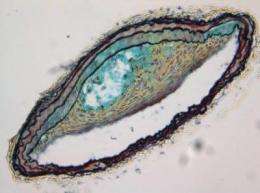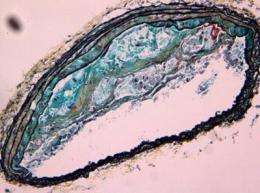Why 'thick' blood protects from a heart attack

"Thick" blood can cause heart attack and stroke, but also prevent them. Scientists at Heidelberg University Hospital have explained the mechanism of this clinical paradox for the first time on an animal model. Mice with a greater tendency to form blood clots have larger plaques in their vessels, but they are more stable. Thus, there is less risk that these plaques will rupture and obstruct circulation. The results of the study have been published in the prestigious journal Circulation.
In principle, the more blood coagulates, the greater is the risk of vascular obstruction. Anticoagulants protect against these complications. But clinical studies have thus far not proven that an increased clotting tendency also has a detrimental effect for plaque development. Dr. Berend Isermann, consultant at Heidelberg University Hospital, Department of Internal Medicine I and Clinical Chemistry (Medical Director: Professor Dr. Peter Nawroth), and his team have now found an explanation for this.
Study on an animal model: larger but more stable plaques
The researchers examined mice with elevated blood fat levels and a genetic defect that leads to an increase in blood clotting. The mice developed larger plaques than those without the genetic defect, but the plaques were more stable. In addition, no vascular obstruction was observed, as the vascular wall expanded to adapt to the new situation. The negative effect of larger plaques on circulation was compensated by the positive effect of stability and a greater vessel diameter.

However, the long-term use of anticoagulants (in this case, low molecular weight heparin) reversed these advantages. The size of the plaques was reduced, but stability was lost, increasing the risk of complications.
Caution advised when prescribing anticoagulants
"Our findings were made on mice, but they confirm the results of clinical studies on humans," says Dr. Isermann. "In addition, in vitro studies show that human cells react similarly to mouse cells." The team assumes that the results can be transferred to humans and recommends weighing the advantages and disadvantages of anticoagulants carefully before administering them to a patient. "Currently," continues Dr. Isermann, "there is no indication that these new observations also apply to drugs that inhibit the function of platelets."
When deciding on therapy, the cause of the coagulation disorder and the degree of already existing atherosclerosis should be taken into consideration. Additionally, they recommend using anticoagulants that inhibit specific coagulation factors in order to preserve the positive effects on plaque stability. Various new drugs that inhibit specific coagulation factors are currently being studied in clinical trials. "It is important," says Dr. Isermann, "that plaque stability and the influence on atherogenesis are also studied in these trials."
More information: Hypercoagulability inhibits monocyte transendothelial migration through PAR-1, PLC?, PI3K, and NO-dependent signaling in monocytes and promotes plaque stability. Stefanie Seehaus, Khurrum Shahzad, Muhammed Kashif, Ilya A. Vinnikov, Martin Schiller, Hongjie Wang, Thati Madhusudhan, Volker Eckstein, Angelika Bierhaus, Florian Bea, Erwin Blessing, Hartmut Weiler, David Frommhold, Peter P Nawroth, and Berend Isermann; Circulation.
Source: University Hospital Heidelberg (news : web)

















